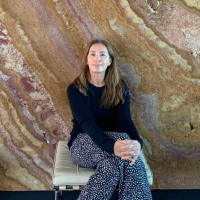My first daughter was a miracle baby.
She came at a time when I had given up all hope of having a biological child. Cycles of hope and disappointment had plagued my life for years.
But, finally, I was blessed with the prayed-for news of a pregnancy.
As I neared my term, happiness and focused joy filled my world. I giddily prepared to receive this gift of a baby, filling my living space with everything heart-shaped.
It was at this particular moment that my mother, who came to stay with us for the birth of her first grandchild, chose to tell me a family story that jolted me out of my nirvana.
My mother was born in 1944, while World War II was still raging in Byelorussia.
Before my mother was born, my grandmother had two other children—a two-year-old girl and a baby boy. She was in the hospital, having just given birth to the boy, when her doctor came in and announced that the war had started and the hospital could no longer accommodate the maternity ward, as they needed all the space for wounded soldiers.
When my grandmother left the hospital, she had no home to return to. The life she knew before had vanished. There was nothing left of the place she called home, because the war had forced the Jews to live in a restricted area of the Minsk Ghetto.
She didn’t let this stop her. Life went on, and my grandmother left her children with a neighbor when she went to work every day. But, one evening my grandmother came back to find that the children were no longer there.
They were gone.
Their lives stolen because they lived in a world filled with unjust hatred.
And my grandmother never had the chance to say goodbye.
Hearing this story as I was about to give birth to my precious little baby, whose safety I was prepared to die for, was torturous. The thought that someone may one day hate my children enough to want to kill them just because they are Jewish is simply intolerable.
It’s taken me years to process this fear and overcome its destructive power. Yet, that kind of thinking, filled with hate toward other human beings is again permeating our conversations and news. Our world has become frighteningly polarized, filled with rhetoric of fear and exclusion.
I wish I could pretend this does not concern me. That my children are safe living their life and dealing with their first-world problems. However, this is now on our doorstep.
Having lived with the stigma of being Jewish in the anti-semitic Soviet Union, Russian in the U.S. in the aftermath of the Cold War, and American in France during the Gulf Wars, I know about being marginalized, if not hated, for my association with each of my cultures.
My reaction to that experience has been to raise my own children embracing their multiculturalism and being open to the beauty of diversity, forever pushing the limits of their identities.
Luckily for my daughter—and for all the children in our community—we live in a surprising microcosm where Muslims, Jews and various denominations of Christians, as well as a good number of aspiring Buddhists, live side by side. From a young age our children speak several languages and find it completely normal that everyone around them is from somewhere else. They go to school and learn to read, count and discover elbow-to-elbow, becoming friends before they even become aware of their differences.
The world of polarization and subliminal enticement to fear and hate could re-activate my own fears. As a mother, I want to keep my children and all children safe. As a woman, I want to preserve peace for the people I love. As a human being, I believe in the overall goodness and capacity of all people to love. I know that I am not alone in these beliefs and that people all over the world share these sentiments, regardless of the country or religion in which they were raised.
As my daughter is preparing to leave home and attend college, I am acutely aware that she will play a role in building our future. Our family’s stories of suffering and injustice are a part of who she is, but her own life experiences and a wider perspective on humanity have prepared her to be an agent of love, compassion and embracing diversity.
As she prepares her university entry essays, she writes about being raised without borders and thriving in her multiple cultures. These are her words:
“I am keenly aware of how my personal experience is very different from what media would have us believe. I observe a dichotomy in the world we live in. On one hand our increasingly connected world shows that as human beings we all seem to want the same things: peace, safety, ability to work and protect our loved ones. Yet in the media and politics there is greater and greater polarization and emphasis on what separates us, causing fear, animosity and mistrust. I have lived the multicultural experiment and I know it can work. I am eager to share that message.”
~
Author: Galina Singer
Image: Used with permission from @gypsieraleigh
Apprentice Editor: Briana DeLucia; Editor: Toby Israel
~






Read 0 comments and reply